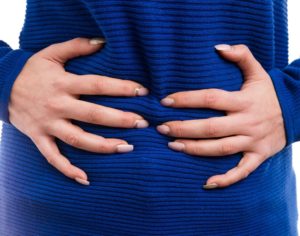Diarrhea with Endometriosis
The chameleon among women’s diseases – that’s what endometriosis is also called. A look at the symptoms shows that this name stands for the variety of complaints that can afflict women with the disease. In addition to the classic symptoms such as lower abdominal pain or menstrual disorders, digestive problems can also occur. Especially when these symptoms are in the foreground, this can lead doctors and patients on the wrong track. Today I’ll tell you why diarrhea does play a role in endometriosis patients and how the symptoms can be alleviated.
Gastrointestinal Distress: An Extension of Endometriosis
Endometriosis, in its intricate manifestation, possesses the power to reshape symptoms. While abdominal pain might dominate one woman’s experience, another might grapple with back pain or infertility. Unveiling a lesser-known facet, digestive complaints intertwine with endometriosis [1].
This category encompasses an array of experiences:
Good to Know!
The connection between diarrhea and endometriosis, while intriguing, often defies complete clarity. The intricate possibility emerges that the inflammatory processes unfolding within the abdomen might exert an influence on the bowels, consequently triggering these symptoms.
Akin to this, these very inflammatory messengers are thought to be implicated in what is known as the “endobelly” phenomenon—a realm warranting ongoing exploration.
Why does endometriosis cause diarrhea?
Endometriosis, a complex condition, occasionally ushers in unexpected companions like diarrhea. Let us delve into the underlying causes together.
Diarrhea ignited by cramps: A hallmark of endometriosis is the onset of abdominal pain. Often tied to menstruation, these pains can also strike during the cycle’s midpoint or in conjunction with sexual activity. Frequently described as cramping sensations [3], these episodes of abdominal distress can disrupt the harmonious functioning of the intestines. The outcome? The hurried passage of stool through the colon, insufficient time for fluid absorption, and the eventual manifestation of diarrhea.
Diarrhea triggered by intestinal endometriosis: Endometriosis extends beyond the uterus, characterized by the growth of endometrial tissue in diverse locations, both within and outside the pelvic realm [1]. Remarkably, it can even invade the brain. In the context of endometriosis within the intestines, the presence of adhesions within the rectum might be signified by diarrhea.
Diarrhea induced by altered microbiome dynamics: Within your intestines, an entire universe of microorganisms thrives. Collectively known as the intestinal microbiome, these microorganisms encompass beneficial and potentially harmful bacteria. In a balanced state, the beneficial bacteria orchestrate food digestion and bolster the immune system’s efficacy [4]. Interestingly, the microbiome might differ in individuals with endometriosis, showcasing elevated levels of Proteobacteria, Enterobacteriaceae, Streptococcus, and Escherichia coli [5]. This realignment in the microbial population can disrupt intestinal equilibrium, triggering diarrhea.
Diarrhea may not always be indicative of intestinal endometriosis
If you have received an endometriosis diagnosis and are grappling with diarrhea, the prospect of the condition invading your intestines might cross your mind. Remarkably, the gastrointestinal tract is a common target of endometriosis lesions beyond the pelvic confines [6]. A study of 355 women who underwent laparoscopy offers intriguing insights. Although 90% of these women reported gastrointestinal symptoms, a mere 7.6% displayed detectable lesions in their intestines. This underscores the notion that gastrointestinal symptoms, while prevalent, are not a definitive indicator of intestinal endometriosis growths [7].
Endometriosis and irritable bowel syndrome: an intricate connection.
A comprehensive meta-analysis reveals a striking correlation: women grappling with endometriosis carry a risk of developing IBS, that is at least double that of others [8]. In the realm of real-world observations, a parallel occurrence of both conditions is often evident, underscoring their interplay. But what exactly is irritable bowel syndrome? Irritable bowel syndrome is categorized as a functional disorder of the bowel, characterized by a range of symptoms. The root causes remain somewhat elusive, although researchers hypothesize that a confluence of factors contributes to its emergence. Stress, disturbances in the intestinal flora, and food intolerances are frequently cited culprits. This syndrome gives rise to abdominal discomfort and digestive irregularities such as diarrhea or constipation, mirroring the very complaints that can arise in the context of endometriosis [2]. Within this framework, differentiating the source of diarrhea becomes crucial. Research has explored interventions like peppermint oil, probiotics, and the FODMAP diet as potential alleviators of IBS symptoms [9,10]. Nonetheless, further investigations are warranted to provide definitive guidance for patients navigating this intricate territory.
Comprehensive assessment of diarrhea
Diarrhea’s impact on quality of life can be staggering, potentially leading to social withdrawal when frequent and unplanned bathroom visits disrupt one’s routine. While diarrhea could possibly signal endometriosis, it is imperative to recognize that concomitant factors, such as food intolerances or irritable bowel syndrome, may be contributing to these symptoms. Thus, a nuanced diagnosis becomes paramount. Clinical evaluations encompass palpation through the intestine or vagina, abdominal ultrasound, and when warranted, advanced imaging modalities like MRI or laparoscopy. Even a colonoscopy is considered, although the elusive nature of endometriosis lesions on the exterior of the bowel often eludes detection through this procedure.
Incidentally, the presence of blood in the stool can serve as an indicator of bowel involvement. If you encounter unexplained blood (red or black) in your stool, consulting a medical professional promptly is strongly advised.
Good to Know!
Tailored management of endometriosis should be pursued under the guidance of a healthcare professional. Medical therapies and surgical interventions stand as viable options in this endeavor [11]. Remarkably, regardless of whether intestinal complications are present, addressing endometriosis can contribute to alleviating diarrhea.
In a Nutshell
Lower abdominal pain typically takes the spotlight as a prominent symptom of endometriosis. Yet, compelling studies unveil that gastrointestinal issues, encompassing diarrhea, are a parallel concern of substantial prevalence. Within this domain, researchers delve into the potential influence of intestinal flora. Plausible factors contributing to this scenario encompass functional disruptions due to cramping or the engagement of the intestines. Notably, given the common occurrence of concomitant irritable bowel syndrome among endometriosis patients, the origin of diarrhea might also be linked to this factor. For individuals with endometriosis, it is pivotal to ascertain the presence of growths within the intestine. Comprehensive management of endometriosis necessitates consultation with a medical professional. Encouragingly, the prospect of mitigating diarrhea emerges as a potential positive outcome of such treatment endeavors.
References
- Diedrich, Klaus. Gynecology and obstetrics (Springer textbook) (German Edition) (p.303). Springer Berlin Heidelberg. Kindle version.
- Endometriose-Vereinigung: Endometriose kommt selten allein Begleitende Beschwerden und Krankheiten. Broschuere Begleiterkrankungen 2019_web.pdf
- Gesundheitsinformation.de: Endometriose
- Shapiro H, Thaiss CA, Levy M, Elinav E. The cross talk between microbiota and the immune system: metabolites take center stage. Curr Opin Immunol. 2014 Oct;30:54-62. doi: 10.1016/j.coi.2014.07.003. Epub 2014 Jul 26. PMID: 25064714.
- Leonardi M, Hicks C, El-Assaad F, El-Omar E, Condous G. Endometriosis and the microbiome: a systematic review. BJOG. 2020 Jan;127(2):239-249. doi: 10.1111/1471-0528.15916. Epub 2019 Sep 19. PMID: 31454452.
- Charatsi D, Koukoura O, Ntavela IG, Chintziou F, Gkorila G, Tsagkoulis M, Mikos T, Pistofidis G, Hajiioannou J, Daponte A. Gastrointestinal and Urinary Tract Endometriosis: A Review on the Commonest Locations of Extrapelvic Endometriosis. Adv Med. 2018 Sep 26;2018:3461209. doi: 10.1155/2018/3461209. PMID: 30363647; PMCID: PMC6180923.
- Maroun P, Cooper MJ, Reid GD, Keirse MJ. Relevance of gastrointestinal symptoms in endometriosis. Aust N Z J Obstet Gynaecol. 2009 Aug;49(4):411-4. doi: 10.1111/j.1479-828X.2009.01030.x. PMID: 19694698.
- Chiaffarino F, Cipriani S, Ricci E, Mauri PA, Esposito G, Barretta M, Vercellini P, Parazzini F. Endometriosis and irritable bowel syndrome: a systematic review and meta-analysis. Arch Gynecol Obstet. 2021 Jan;303(1):17-25. doi: 10.1007/s00404-020-05797-8. Epub 2020 Sep 19. PMID: 32949284.
- Alammar N, Wang L, Saberi B, Nanavati J, Holtmann G, Shinohara RT, Mullin GE. The impact of peppermint oil on the irritable bowel syndrome: a meta-analysis of the pooled clinical data. BMC Complement Altern Med. 2019 Jan 17;19(1):21. doi: 10.1186/s12906-018-2409-0. PMID: 30654773; PMCID: PMC6337770.
- Moayyedi P, Ford AC, Talley NJ, Cremonini F, Foxx-Orenstein AE, Brandt LJ, Quigley EM. The efficacy of probiotics in the treatment of irritable bowel syndrome: a systematic review. Gut. 2010 Mar;59(3):325-32. doi: 10.1136/gut.2008.167270. Epub 2008 Dec 17. PMID: 19091823
- German Society of Gynecology and Obstetrics: Guideline Program. Diagnosis and therapy of endometriosis. August 2020.
On another note, delve deeper into the realm of diarrhea within endometriosis by exploring our Symptom Explorer for additional insights.
- Pharmaceutical Companies and Their Influence on Scientific Research - 7. October 2023
- Identification of a Genetic Factor Linked to Endometriosis Development and Potential Therapeutic Targets - 6. October 2023
- Identification of a Genetic Factor Linked to Endometriosis Development and Potential Therapeutic Targets - 6. October 2023


